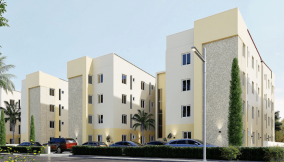While Nigeria’s economy contracted in the second quarter of 2020, the real estate sector which is considered a laggard, usually the last to report growth, went opposite direction after showing sign of a rebound.
According to the recent data released by the National Bureau of Statistics (NBS), Nigeria’s real estate sector moved to the path of recovery after its rate contraction eased for the first time in one year.
“Real estate transactions increased after industry players adjusted to the impact of COVID-19 and a lot of real estate deals do not reflect on NBS report. That is the driver for the recovery movement,” a Lagos-based analyst said on condition of anonymity.
Even though the growth reported by the property market in the third quarter of 2020 at -13.40 percent was –11.09 percentage points lower than the growth recorded in the comparable quarter of 2019, the sector performance in Q3 was 8.59 percentage points higher than the -21.99percent reported in Q2.
“Real estate is about the most attractive asset class, currently, and we have seen a lot of traction during recessionary times,” Tayo Odunsi, CEO, Northcourt Real Estate, said.
After the real estate industry entered its second recession in three years in the third quarter of 2019, it plunged further into contraction for three consecutive quarters to the month ended June 2020 before it eased in Q3, as gleaned from NBS GDP report.
With a sharp fall to -21.99 percent in the second quarter of 2020, Nigeria’s real estate sector touched its lowest level since 2016.
The measure of the total monetary value of economic activities in the property industry in Q2 was –18.15 percentage points lower than the -3.84 percent growth recorded in the corresponding quarter of 2019, and –16.72 percentage points relative to the -5.27 in Q2 2016.
Like many other industries, Nigeria’s property sector which is yet to recover from the country’s 2016 recession was disrupted by the impact of COVID-19 as lower oil price and the slowdown in economic activities slowed industry activities.
With a housing deficit estimated at 20 million units, the property industry in Africa’s most populous nation contributed 5.58percent to real GDP in Q3 2020, lower than the 6.21 percent it recorded in the corresponding quarter of 2019.
Meanwhile, banks’ confidence in the real estate sector increased in the second quarter of 2020 as the selected banking data by NBS showed that credit to the industry rose to N666.73billion, the highest in almost two years but lower than the N710.2 billion reported in the comparable quarter of 2018.
Sectoral credit allocation to real estate was up by N83.77 billion year-on-year from N582.96 in Q3 2019 to N710.20 billion in the corresponding quarter of 2020.
While the impact of COVID-19 could be blamed for Nigeria’s first economic contraction and slow pace of the real estate sector, an evaluation of the country’s macro-economic indicators before the pandemic exposes how the pandemic only made what was already a bad situation worse for the economy.
Long before the pandemic started spreading across the globe late last year, Nigeria’s economy had been gasping for breath for five years.
Before COVID-19 pandemic, access to affordable housing in Nigeria was crippled by, among other factors, the lack of non-functioning mortgage system, high cost of property development buoyed by the country’s 42-year old Land Use Act.
Individual efforts at increasing Nigeria’s real estate assets by way of developing more houses have not helped to reduce the demand-supply gap or increased the home ownership level.
Despite its large-size population, Africa’s largest economy is crawling behind its peers in terms of homeownership level. Whereas homeownership rate is 84 percent in Indonesia, 75 percent in Kenya and 56 percent in South Africa, Nigeria has 25 percent.
According to industry analysts, the economic downturn in Nigeria which has left many consumers with shrinking wallet also presents an investment opportunity for real estate investors as well as home buyers as they now have higher bargaining power.
“We typically tell people to buy assets because assets are cheaper in recession. So, it’s a good time to buy real estate,” Odunsi said.
Join BusinessDay whatsapp Channel, to stay up to date
Open In Whatsapp





